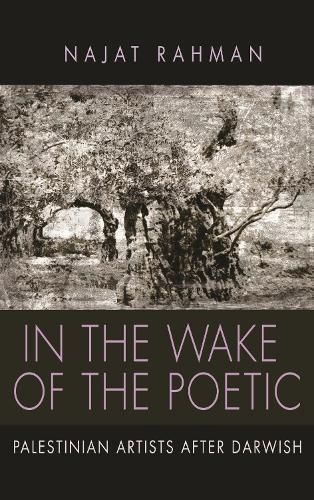Readings Newsletter
Become a Readings Member to make your shopping experience even easier.
Sign in or sign up for free!
You’re not far away from qualifying for FREE standard shipping within Australia
You’ve qualified for FREE standard shipping within Australia
The cart is loading…






Heralding a new period of creativity, In the Wake of the Poetic explores the aesthetics and politics of Palestinian cultural expression in the last two decades. As it increasingly gains a significant presence on the international scene, much of Palestinian art owes a debt to Mahmoud Darwish, one of the finest contemporary poets, and to Palestinian writers of his generation. Rahman maps the immense influence of Darwish’s poetry on a new generation of performance artists, visual artists, spoken-word poets, and musicians.
Through an examination of selected works by key artists-such as Suheir Hammad, Ghassan Zaqtan, Elia Suleiman, Mona Hatoum, Sharif Waked, and others-Rahman articulates an aesthetic founded on loss, dispersion, dispossession, and transformation. It interrupts dominant regimes, constituting acts of dissension and intervention. It reinscribes belonging and is oriented toward solidarity and future. This innovative wave of experimentation transforms our understanding of the national through the diasporic and the transnational, and offers a profound meditation on identity.
$9.00 standard shipping within Australia
FREE standard shipping within Australia for orders over $100.00
Express & International shipping calculated at checkout
Heralding a new period of creativity, In the Wake of the Poetic explores the aesthetics and politics of Palestinian cultural expression in the last two decades. As it increasingly gains a significant presence on the international scene, much of Palestinian art owes a debt to Mahmoud Darwish, one of the finest contemporary poets, and to Palestinian writers of his generation. Rahman maps the immense influence of Darwish’s poetry on a new generation of performance artists, visual artists, spoken-word poets, and musicians.
Through an examination of selected works by key artists-such as Suheir Hammad, Ghassan Zaqtan, Elia Suleiman, Mona Hatoum, Sharif Waked, and others-Rahman articulates an aesthetic founded on loss, dispersion, dispossession, and transformation. It interrupts dominant regimes, constituting acts of dissension and intervention. It reinscribes belonging and is oriented toward solidarity and future. This innovative wave of experimentation transforms our understanding of the national through the diasporic and the transnational, and offers a profound meditation on identity.